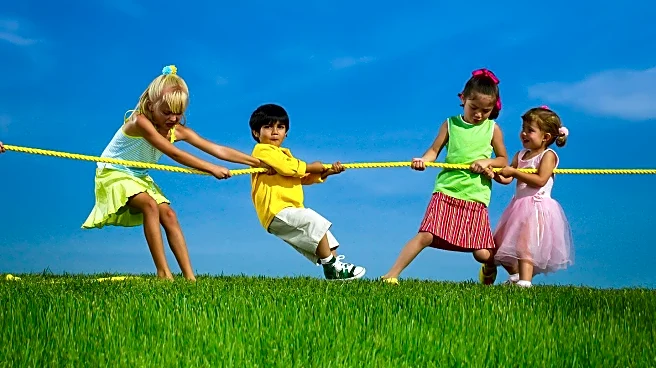What's Happening?
A summer camp in the Carpathian mountains near Svalyava, Ukraine, offers a respite for children affected by the ongoing war. Hosted by Tetiana and Alex Svatenkova, the camp provides a safe environment away from air raid alarms and the constant threat of conflict. The camp, which has been running since 2017, relocated from Kyiv to the mountains for safety reasons. It accommodates children aged 9 to 16, primarily from Kyiv and Dnipro, allowing them to engage in activities like role-playing, water fights, and dance. Tetiana, a psychologist, notes the war's impact on children's social skills and emotional regulation, highlighting the importance of the camp in providing a sense of normalcy and confidence.
Why It's Important?
The camp serves as a crucial intervention for children who have been living under the shadow of war, offering them a chance to develop social skills and emotional resilience. The psychological impact of the war has been significant, with children showing increased reliance on mobile phones as a form of control and comfort. By providing a space free from the immediate dangers of conflict, the camp helps mitigate some of the war's adverse effects on young minds. This initiative underscores the importance of mental health support and social engagement for children in conflict zones, potentially influencing future policies on child welfare and education in war-torn areas.
What's Next?
The Svatenkovas plan to continue hosting the camp annually, adapting activities to meet the evolving needs of the children. They aim to expand their efforts by possibly increasing the number of children they can accommodate, while maintaining a personalized approach to each child's development. As the war persists, the camp's role in providing psychological relief and fostering resilience becomes increasingly vital. The couple's commitment to the camp highlights the need for similar initiatives across Ukraine, potentially inspiring other educators and psychologists to create safe spaces for children affected by conflict.
Beyond the Headlines
The camp's existence raises broader questions about the long-term psychological effects of war on children and the role of educational and recreational programs in addressing these issues. It also highlights the resilience and adaptability of communities in conflict zones, as they seek innovative ways to support their youth. The Svatenkovas' approach could serve as a model for integrating psychological support into educational settings, emphasizing the importance of holistic care in nurturing future generations.










